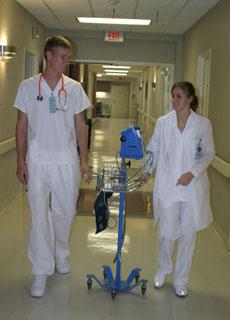Freeman builds future through investing in Southern students

Freeman builds future through investing in Southern students
When Southern asked for donations for the football stadium, it didn’t expect a quarter of a million dollars for the nursing program.
“We went to Freeman to solicit help with turf,” said Curt Betebenner, Foundation Director. “They weren’t interested in turf, but asked about the nursing program. So John Tiede, director of major gifts and planned giving at the Missouri Southern Foundation, and I went to talk to them.”
What resulted was Freeman Health System’s plan to donate $50,000 a year for five years to the nursing program at Missouri Southern. This funded salary for another faculty member and allowed 10 more students to be accepted into the nursing program.
Gary Duncan, President and CEO of Freeman Health System, said the idea for the donation came from nursing shortages in the area. Freeman looked at what kept schools from graduating more nursing students and decided to help.
The number one cost in the health program is human resources. According to Dr. Tia Strait, dean of technology Southern requires a faculty to student ratio of 1:5 for the nursing program.
With Freeman’s help the number of students in the program jumped from 41 to 51.
“I think [the donation] came at a time when we were really needing to increase the number of graduates from our nursing program to meet the needs of area medical centers,” Strait said.
“We thought if we provided for a new instructor it would benefit us, them, and the community,” said Kay Breinig, Chief Clinical Officer at Freeman. “And there’s no guarantee they are going to come to us [when they graduate] but it’s still a benefit to the community.”
Aging baby-boomers and their medical needs will only increase the number of nurses needed in the coming years. While Breinig said Freeman is doing better with the shortage of nurses than other hospitals, nevertheless, the shortage is one of the reasons the partnership between Freeman and Southern is critical.
“Right now we’re sort of ahead of the game in the Southwestern Missouri nursing shortage,” Breinig said. “We’re not way ahead of the game, but we’re ahead of the game compared to most places in the country, including metropolitan areas.”
Duncan said Freeman has been very pleased with the “caliber of student” that comes from Southern and they plan to continue the partnership between the University and the hospital.
“I think Southern has done a very good job in that their students’ pass rate on the boards has been excellent,” he said.
Students often describe clinicals as one of the best and yet the most difficult parts of the nursing program. Ashley Roehrs, junior nursing major, is one of the Southern students finishing her clinicals, at Freeman this semester.
“At first, we were basically just taking vitals, giving bed baths and talking to the patients,” Roehrs said. “Now that the semester is almost over, we have an entire list of things that we can do to fill our day.”
Junior nursing major Aaron Rippelmeyer said the experience has given him a better education.
“Getting hands on experience with real patients builds my confidence, and it is a lot different than working on dummies in the lab,” Rippelmeyer said.
They don’t spend their days alone at the hospital though, Freeman nurses are there, guiding them and teaching them along the way.
“The nurses at Freeman are awesome,” Roehrs said. “They are always there if we need anything. They answer all of our questions, walk us through procedures, and anything else that we may have problems with.”
Duncan, who often rides the shuttle back to the employee parking with students, enjoys the student enthusiasm.
“It’s neat because there’s an excitement among the nursing students that I find refreshing. I mean, I think people are only in nursing that want to be in nursing and it’s really reflected in the Southern students.”
By looking at the numbers, it’s true. One of the most selective programs at Southern is the nursing program. Not all 51 students accepted into the nursing program graduate with a nursing degree.
The attrition (loss rate) is 10 to 30 percent. Reasons for leaving vary student to student. Some leave because of academics or personal issues, and others discover during clinicals that nursing is not the profession for them.
“We want graduates who can pass the licensure exam and quality technicians who will be out there taking care of our mothers, fathers, and children,” Strait said.
Your donation will support the student journalists of Missouri Southern State University. Your contribution will allow us to purchase equipment and cover our annual website hosting costs.















